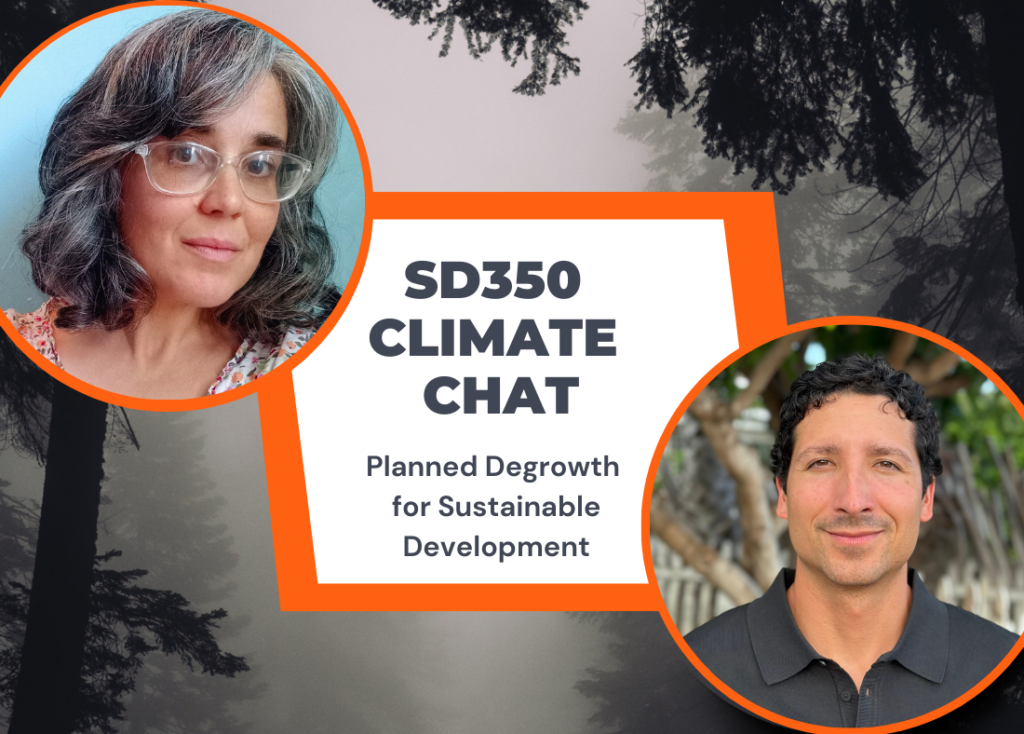By Anne Sheridan, Co-Chair of the CAP Committee

On August 29th, I, along with one of my colleagues, Chad Baron, gave a Climate Chat entitled Planned Degrowth for Sustainable Development. (If you missed it, you can watch the recording and access our slides.) When our Climate Chat was announced, there was some concern about whether it was wise for SanDiego350 to be seen supporting a topic that some feel might be unpopular or negative. So we decided it would be good to take some time both during our presentation and in this article to outline how degrowth – which we define as a planned democratic and equitable reduction of excess resource and energy use that leads to wellbeing for all within ecological limits – has gained the attention of climate scientists and activists and briefly describe what it means.
Coincidentally, on the same day we gave our Climate Chat, the newly elected Vice-Chair of the Intergovernmental Panel on Climate Change (IPCC), Diana Ürge-Vorsatz, gave the opening keynote address at the Ninth International Degrowth Conference (which you can see here, starting at the 40:47 mark). And last July, one of the co-founders of 350.org, Bill McKibben, wrote an article discussing degrowth. However, despite this increased attention, degrowth seems to be greatly misunderstood in much of the media where it gets compared to austerity, recessions, and self-sacrifice, which is why we were grateful to have the opportunity to explore this topic with others within the SanDiego350 community where we laid out some key points.
First, we looked at the idea of ecological limits, which is something many of us are very familiar with. As many of you already know, not only are we not on track to meet the emissions reduction targets set in the Paris Agreement, but we are also transgressing five other planetary boundaries such as biodiversity loss, loss of forests, and chemical pollution and have also grown our ecological footprint beyond the planet’s capacity. Our presentation showed how closely carbon emissions are tied to economic growth (as measured by Gross Domestic Product, or GDP), how economic growth has been the main driver of increasing carbon emissions, and how the only time global emissions have decreased is when there has been a decrease in GDP.
Next, we discussed how economic growth is not only a poor method for measuring wellbeing, since it doesn’t consider life satisfaction, community involvement, or mental wellbeing, but how it can also lead us astray by causing us to focus on the wrong goal. For example, many social improvements such as an increase in public transportation and a move to universal health care would likely cause a decrease in GDP due to their respective impacts on the automotive or insurance industries. Additionally, we know that the link between life satisfaction and GDP flattens out after a certain level – something we can easily comprehend by recognizing the lack of happiness even in the most affluent of countries.
It should not come as a shock to anyone that in order to live within planetary boundaries and improve wellbeing, we need to produce less stuff. Some of this is obvious – we need fewer cars, plane trips, pesticides, steaks, and plastic trinkets. We need to put the brakes on planned and perceived obsolescence, cut down on fast fashion, pull back on advertising, and go back to making things that last longer and that can be repaired. What hasn’t been obvious is how we are going to do that in an economic system that is hellbent on growth at all costs. This is why advocates of degrowth also promote fiscal and monetary reform that include policies such as closing tax havens and reining in big banks. It also means making sure that we have safety measures in place by implementing policies such as a working time reduction, job guarantee, and universal basic income.
Such a transition away from an economy that depends on growth to one that is “growth agnostic” or “beyond growth” must also be both equitable and democratic. We must recognize both inequity among individuals, where the richest 1% of the population emit more than half of the global population, and the global inequality that perpetuates the debt cycle of countries of the Global South and forces them to manufacture consumer products for the rich countries instead of focusing industries that increase the wellbeing of their population. Advocates of adopting a post-growth economy also argue for an expansion of our understanding of democracy and argue that individuals must be allowed to participate in decisions about our economy, both on a global and local scale.
While it doesn’t make sense for SanDiego350 to take a position on degrowth as a whole – it’s much too complicated a subject – I believe it is useful for our community to be informed about many of the policy suggestions that come out of degrowth scholarship and activism. We can see some of this crossover already, when we recognize, for example, that everyone simply purchasing electric vehicles isn’t the whole answer and we need to push for public transportation as well, or that we need to advocate for a more circular economy and a just transition. I hope that starting this conversation will help inform our work in the future.
Anne Sheridan has worked on many of SanDiego350’s policy teams and helped establish Degrowth California. You can reach Anne at anne@sandiego350.org.
